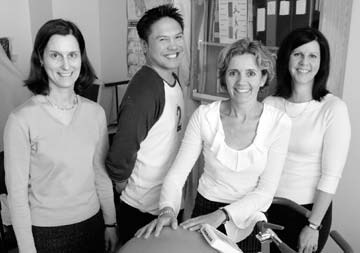Post-Polio clinic only one in Quebec

At the Post-Polio Clinic at the Montreal Neurological Hospital, a multi-disciplinary team helps patients manage their symptoms and improve their quality of life. Some of the team members, from left to right: Dr. Daria Trojan, physiatrist; Robert Campos, occupational therapist; Dr. Diane Diorio, neurologist; and Marie-France Lanoie, physiotherapist.
Until recently, polio was universally dreaded. Epidemics struck without apparent reason, leaving thousands of people - usually children - paralyzed or seriously disabled. Patients' lives were laid to waste. Only with the development of the Salk vaccine in 1955 was this terrifying disease finally tamed.
Yet the grim legacy of polio still lingers. A debilitating disorder known as post-polio syndrome (PPS) affects many of the estimated 50,000 Canadians who had polio between 1927 and 1962. Diagnosing and treating PPS is the goal of the Post-Polio Clinic at the Montreal Neurological Institute and Hospital, part of the McGill University Health Centre. The clinic is the only facility in Quebec dedicated to helping people with this disorder.
"As many as 60 percent of polio survivors have PPS," says Dr. Daria Trojan, Physiatrist and Director of the Post-Polio Clinic. "Symptoms can appear as long as 30 or 40 years after the original illness. Major warning signs are new and persistent muscle weakness, fatigue and pain." The disorder may also cause difficulty in breathing or swallowing.
Because the last polio epidemics in North America occurred in the 1950s, most clinic patients are in their fifties or sixties. However, the clinic also treats patients from other age groups, including some in their twenties and thirties who immigrated to Canada from areas where polio is not yet eradicated.
No single diagnostic test exists for post-polio syndrome. "PPS is a 'diagnosis of exclusion,'" says Dr. Trojan. "We need to do many investigations to be sure patients' symptoms have no other causes. For instance, we refer some patients for evaluation for sleep apnea, which can also be a cause of general fatigue."
Blood tests as well as a range of radiological procedures such as X rays and CT (computed tomography) scans may be necessary to establish a diagnosis of PPS. While its exact cause is still unknown, the disorder appears to be the long-term result of damage to motor neurons - the nerve cells which control and activate muscles.
"Acute paralytic polio attacks and damages motor neurons," explains Dr. Trojan. "This leaves muscles weakened or paralyzed because they are denervated - that is, they have no nerves to control and activate them. The neurons that survive can 'take control' of some or all of the denervated muscle fibres."
"As a result, motor neurons in polio survivors may control up to seven or eight times the normal number of muscle fibres. It's thought that, over time, they simply cannot support such a large number of muscle fibres. The muscle weakness we see in PPS may be caused by overextended motor neurons simply 'giving out' after many years."
At the present, there is no cure for PPS, nor even a well-defined course of treatment. Patients must be assessed and managed on a case-by-case basis. "Exercise is useful for some patients, but it's definitely not for everyone," says Dr. Trojan. "If exercise is appropriate, it needs to be done very carefully, preferably under the supervision of an experienced physiotherapist. Over-exercising can actually cause further difficulties.
"At the clinic, we educate people with PPS, refer them to physiotherapists or occupational therapists, and prescribe appropriate equipment, including leg braces, wheelchairs or crutches. We also focus on pain management, because people with PPS are often prone to musculoskeletal difficulties, and therefore often suffer joint pain. Many of our patients learn a technique called pacing. This involves taking regular rests during periods of activity to help manage fatigue and muscle pain."
"PPS is not a high-profile health problem," says Mario Di Carlo, former President of Polio Quebec, a not-for-profit association dedicated to raising awareness of PPS and helping people with the disorder. "As a result, many of the estimated 7,000 polio survivors in Quebec may not even be aware they have it.
"If polio survivors do experience new muscle weakness, fatigue, or pain, they should ask their doctors whether they might have PPS. Or, they should ask for a referral to the Post-Polio Clinic, where they can be assessed by experts. Doctors can't cure PPS, but they can help patients manage symptoms and improve their quality of life."
